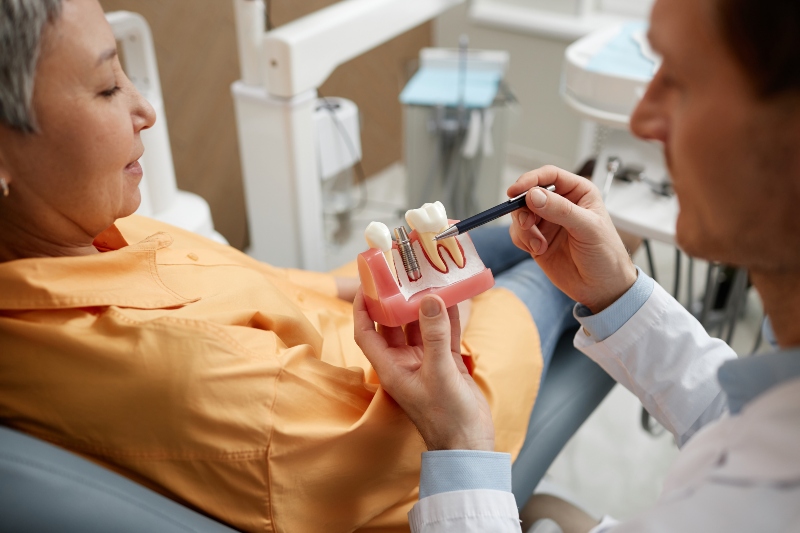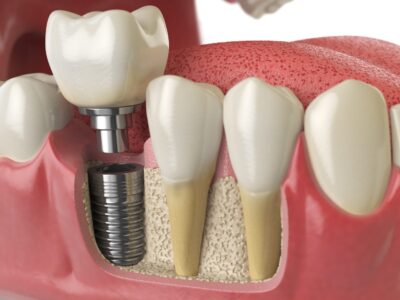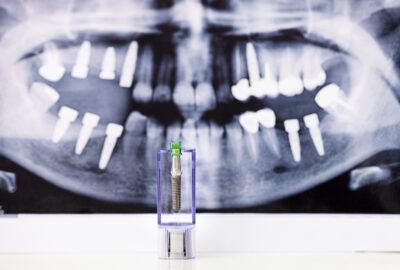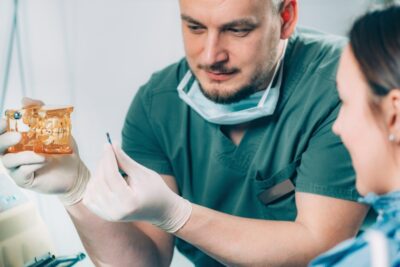
When it comes to protecting natural teeth while replacing damaged or missing teeth, your dentist may recommend a modern and permanent treatment with a world of benefits – namely, dental implant surgery.
Dental implants are an excellent option for protecting remaining teeth while halting any future damage from missing teeth. Therefore, unlike dentures, dental implants are veritably a lifelong solution.
Still, most patients are wary about oral surgery of any kind, and understandably so. A trip to a dental office can be intimidating, especially if any dental surgery – even an outpatient surgery like the dental implant procedure – is involved.
However, dental implant surgery is a minimally invasive treatment plan. Also, depending on the dental implant patient’s medical history, the dental implant procedure can often be completed in a day.
If your dental services provider recommends orthopedic implants or dental implants as the ideal solution for enhancing your smile, it’s important to understand the full journey ahead. This includes everything from your first consultation with an oral surgeon (or maxillofacial surgeon) to the comprehensive healing process following the completion of the dental implant procedure.
Today, let’s discover the leading dental implant specialists in the Bay Area, dedicated to restoring smiles with the latest implant technology. Here’s an insightful guide to what you should expect at each stage of this transformative experience.
Table of Contents
Why is Dental Implant Surgery Recommended?
Dental Implants: What to Expect During the Implant Surgery
Inserting Dental Implant and Bone Grafting
How Long Does a Dental Implant Procedure Take?
What to Expect After the Dental Implant Surgery?
How Long Do Dental Implants Last?
Benefits and Risks of Dental Implants
Discover the Benefits of Dental Implants with Pannu Dental Group
What Are Dental Implants?
Dental implants are effectively artificial teeth that are used to replace damaged or missing teeth at the implant site. Also, dental implants last longer than other replacement tooth solutions. Just like a temporary crown or dentures, it can resolve many issues, from adding multiple replacement teeth to addressing just one missing tooth.
What Are Dental Implants Made Of?
Dental implants are made of materials that follow the international safety standards outlined by the International Organization for Standardization (ISO) or ASTM International.
Most dental implant systems are made of titanium or zirconium oxide. However, other materials such as gold alloys, cobalt-based alloys, titanium alloys, or ceramic materials are also sometimes used. Regardless of the combination of materials, dental implants are applied by oral and maxillofacial surgeons to provide permanent replacement teeth that are designed to last for decades.
Why is Dental Implant Surgery Recommended?
Your oral surgeon or other dental services provider may recommend dental implant surgery for any number of reasons during an initial consultation or other dental office visit. A sample of reasons why a dental implant procedure is recommended, as outlined by the Mayo Clinic, include the following.
- The dental implant patient has a missing tooth or multiple missing teeth.
- The dental implant patient has a jawbone that’s reached total growth.
- The dental implant patient has an adequate jawbone to secure the dental implants or can have a bone graft. (More information on bone grafts is outlined below.)
- The dental implant patient has healthy oral tissues.
- The dental implant patient does not have other health conditions that will affect bone healing.
- The dental implant patient does not want to wear temporary dentures or is unable to wear dentures.
- The dental implant patient is willing to commit several months to the dental implant procedure process for the dental implants and new teeth to heal properly.
There may be other considerations that your oral and maxillofacial surgeon considers before recommending dental implant surgery. This can include the health of bone tissue and gum tissue, conditions like gum disease and/or periodontal disease, and how many teeth need to be replaced.
An expert in implant dentistry can help guide the way in determining if dental implant surgery is the right option for you and will take all factors into account before recommending dental implants.
Dental Implants: What to Expect During the Implant Surgery and Healing Process
Dental implant surgery generally replaces tooth roots with metal posts and replaces damaged or missing teeth with artificial teeth that look and function like natural teeth.
How dental implant surgery is performed depends on the dental implant type and the patient’s jawbone condition. However, dental implant surgery may entail any or all of the following steps.
Initial Consultation
Oral or maxillofacial surgeons will start with a consultation to determine the condition of a patient’s jawbone. Then, they will decide on the best dental implant procedure or other dental work to proceed.
Issues with bone loss, tooth roots, gum tissue, or other problems with the lower or upper jaw – depending on the surgical site – can all raise red flags before the dental implant surgery begins. As such, your oral surgeon will likely take X-rays and impressions to look for potential hurdles. They will also match the color of your natural teeth to ensure any new tooth matches your existing smile.
Tooth Extraction
If needed, your oral surgeon will perform a tooth extraction before a new tooth is implanted, particularly if you have an existing natural tooth or teeth that require replacement.
This can generally be performed on the same day as the dental implant surgery. In addition, your dentist will likely use local anesthesia around the implant site (or the site of the soon-to-be missing tooth) to remove any pain. Because of the local anesthesia, patients will likely feel a light tug when the tooth extraction occurs, but nothing else.
Suppose your dental implant surgery is not on the same day as your tooth extraction. In that case, you should avoid blowing your nose, spitting, smoking, or drinking through a straw until the artificial tooth implant is permanently affixed during the dental implant process.
Inserting the Dental Implant and Bone Grafting
There are two types of dental implant procedures: one where the dental implant is inserted directly into your jawbone and one where the dental implant goes directly under your gumline.
The dental implant surgery can proceed if your jawbone is strong enough. If not (which will be discovered during the initial consultations), then you may require bone grafting as part of the procedure.
Bone grafting entails making a stronger jawbone. Since there can be a lot of pressure when you chew – (even when you eat soft foods) –you need your jawbone to be strong enough to protect your future dental implants.
If your jaw needs a stronger bone, your oral surgeon will remove bone graft materials from the dental implant placement area. A local anesthetic or IV sedation may be utilized. Additionally, bone grafts can often be completed with a single visit to the dentist’s chair.
Therefore, once the bone graft is complete, you may need to allow the bone to heal first before the dental implant procedure begins. Bone grafts may sound intimidating, but they are not uncommon. They can be a routine part of the dental implant surgery process.
Once the dental implant is added to your jawbone, the jawbone will then begin to grow around the implant and become part of your natural gum line. This is a process that may take between three and nine months. Furthermore, it may require follow-up visits to the dentist regularly, to ensure that the recovery process is progressing as planned.
Abutment Placement
Once the dental implants have been installed, your oral surgeon or dentist will place an abutment on top of the implant. That connects the dental implant to your crown. A local anesthetic is used in this part of the procedure, and sometimes, the abutment can be placed at the same time as the dental implant since it goes just past the gum line.
Adding a Permanent Crown
After your gums heal, the last step is to add the artificial tooth or crown. Depending on your individualized process, you may have a removable dental implant or permanent dental implants. If you are adding multiple teeth in the back (like dentures), you may want to opt for the removable option so you can clean and replace the implants as needed. Otherwise, the surgeon will place the dental implants permanently.
How Long Does a Dental Implant Procedure Take?
Depending on your unique oral health and needs, the dental implant surgery itself only takes about 1-2 hours per artificial tooth required. Additionally, local anesthesia or IV sedation may be administered during the process.
After that, a few months of recovery time (as well as follow-up visits or procedures) may be required to let gums heal and ensure the dental implant procedure was successful.
What to Expect After the Dental Implant Surgery
After the surgery, you may experience some minor bleeding or bruising and some pain around the implant site. Your oral surgeon may prescribe antibiotics. They may also recommend other measures – like eating soft foods – to decrease your chances of infection or other issues.
The important thing is to keep up good oral hygiene habits after the dental implant procedure is complete. This includes routine practices like brushing, flossing, and eating soft foods whenever possible. Also, it is best to avoid habits that may cause further damage and curtail the healing process, like smoking or eating tough foods like hard candies.
How Long Do Dental Implants Last?
The average lifespan of dental implants is anywhere from 10 to 30 years. That number climbs higher when you use an experienced dental services provider like Pannu Dental Group. They use the latest technological advancements – like the Yomi Dental Robot – to ensure dental implant surgery is as minimally invasive as possible.
Benefits and Risks of Dental Implants
According to the FDA, dental implants can significantly improve the quality of life and the health of a person who needs them. However, complications may sometimes occur, and there are some risks to bear in mind before dental implant surgery is performed.
The benefits and risks of dental implant surgery, as outlined by the FDA, include the following:
Benefits of dental implants:
- Restore a patient’s ability to chew.
- Enhance and restore a patient’s cosmetic appearance.
- Help keep a patient’s jawbone from shrinking due to bone loss.
- Help to preserve the health of the surrounding bone and gums.
- Help to keep adjacent or nearby teeth stable.
- Improve a patient’s quality of life, confidence, and oral health.
Risks that may be associated with dental implants:
- There may be damage to the surrounding natural teeth during the implant placement.
- There may be damage to the surrounding tissues during surgery, such as sinus perforation.
- A local infection in the bone and gums that support the dental implant body after the surgery.
- There may be delayed healing, which can be more likely in patients who smoke regularly.
- There may be some difficulty initially cleaning the gums around the implant, resulting in poor oral hygiene.
Remember that the best way to avoid risks is to be informed beforehand and follow post-surgical instructions. Additionally, enlist a dental group with years of experience and years of successful dental implant surgeries.
Learn More About Dental Implants in the San Jose Area and Beyond
If you are self-conscious about your teeth, smile, or oral health in general, then you are not alone.
Many candidates for dental implants avoid going to the dentist’s office. That is because they think their natural teeth are beyond repair and are concerned about the dental implant process, or they are not interested in temporary solutions like dentures.
However, there are several misconceptions about dental implants, starting with the fact that dental implant surgery is a lengthy, painful process.
At Pannu Dental Group, we use revolutionary technology to ensure that every procedure meets and exceeds a patient’s expectations, starting with the recruitment of the Yomi Dental Robot system. Renowned as the first and only FDA-approved surgical robot for dental implant surgery, this tool serves as a guiding hand and an additional resource for our exceptional oral surgeons. Therefore, it adds an extra layer of peace of mind for patients that the surgery is safe and effective.
Even with a dental services provider with the best tools available (like Pannu Dental Group), dental implants have a success rate of 97% over a 10 year period, a decreased risk of cavities and endodontic problems of adjacent teeth, and a reduced sensitivity of adjacent teeth.
This makes dental implants a sound solution for a range of oral health concerns, from cosmetic enhancements now to better health and protection years down the road.
Discover the Benefits of Dental Implants with Pannu Dental Group
When it comes to dental implants in the San Jose region, we are the only service provider that uses the Yomi Dental Robot. This is in addition to our exceptional and experienced team of professionals who are solely focused on our patient’s care and comfort.
We are a verifiable team of dental implant specialists and are available to provide a free initial consultation. We will discuss the next steps to determine if dental implants are the best option for your unique dental and health needs.
Don’t let self-consciousness or fear of time in the dentist’s chair prevent you from taking steps that will improve your oral health from the inside out. Dental implants can have a wealth of benefits for a patient struggling to smile, providing strong teeth and a beautiful set of teeth that can last for a lifetime.
Reach out to us today to start the conversation. Find out if dental implants are right for you based on your medical history and current health issues. With a trusted resource like Pannu Dental Group, you can perfect your smile and gain miles of self-confidence while finding a permanent solution that will change your oral health and your life.

Dr. Dalvir S. Pannu has been a practicing dentist since 1995. In 1996 he opened his first dental practice in India, where he gained invaluable experience and acumen. In October of 1997 he was invited by the American Dental Association (ADA) to present the table clinic on Endodontics, at their annual session held in Washington, D.C. At this time he fell in love with the United States and became passionate about practicing dentistry in California. He became particularly enamored of the San Francisco Bay area, and soon took up residence and work here.





